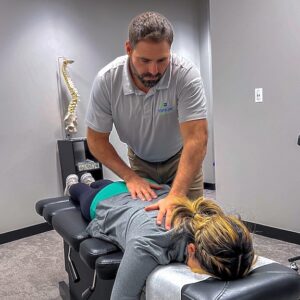In a world where holistic healthcare is gaining more recognition and popularity, finding the right chiropractor to address your individual needs can be a life-changing decision. Whether you’re seeking relief from back pain, improving your posture, or enhancing your overall well-being, choosing the right Chiro West Schaumburg is crucial. But with so many options available, the search can feel overwhelming. Don’t worry; we’re here to guide you through the process in an informative and casual manner.
Understanding Chiropractic Care
In a world where holistic healthcare is gaining more recognition and popularity, finding the right chiropractor to address your individual needs can be a life-changing decision. Whether you’re seeking relief from back pain, improving your posture, or enhancing your overall well-being, choosing the right Chiro West Schaumburg is crucial. But with so many options available, the search can feel overwhelming. Don’t worry; we’re here to guide you through the process in an informative and casual manner.
Chiropractors are not medical doctors, but they receive extensive training in their field, and their practice is regulated in many countries. This holistic approach often provides drug-free, non-invasive solutions for a wide range of conditions, including back pain, neck pain, headaches, and more. Now, let’s get into the nitty-gritty of how to find the right chiropractor for your individual needs.

1. Do Your Research
The first step in finding the right chiropractor is to do your homework. Thanks to the internet, you can easily research and gather information about chiropractors in your area. You can start by visiting the website of the Evolve Chiropractic Center at myevolvechiropractor.com for reference.
While on their website, you can look for information about their services, expertise, and patient testimonials. This will give you an initial impression of the chiropractic center and help you decide if you want to explore their services further. You can also use online directories or search engines to find a list of chiropractors in your area.
2. Ask for Recommendations
Personal recommendations from friends, family, or coworkers can be invaluable. If someone you trust has had a positive experience with a chiropractor, it’s worth considering. They can provide insights into the chiropractor’s approach, personality, and the effectiveness of their treatments. Remember that everyone’s needs and experiences are different, so while a particular chiropractor may be a great fit for your friend, it may not be the best choice for you. Nonetheless, recommendations can be a good starting point for your search.
3. Check Qualifications and Credentials
Ensuring that your chosen chiropractor has the right qualifications and credentials is a critical step in finding the right fit for your needs. Chiropractic care involves specialized training, and a licensed chiropractor with proper education can offer safe and effective treatments.
a) Education and Training
Chiropractors must earn a Doctor of Chiropractic (D.C.) degree from an accredited chiropractic college. This typically involves four years of professional study after completing undergraduate education. During this period, they undergo intensive training in anatomy, physiology, neurology, radiology, spinal adjustments, and other related subjects.
Look for information about the chiropractor’s alma mater, graduation date, and any additional certifications or postgraduate training. A well-rounded educational background ensures that the chiropractor is equipped with the knowledge and skills necessary to provide competent care.
b) Licensing
Every state or country has its own licensing board or authority responsible for regulating chiropractic practice. Verify that the chiropractor you’re considering is licensed and in good standing with the relevant regulatory body. Licensing ensures that the chiropractor meets specific standards of education and ethics, providing you with a level of assurance regarding their competence and professionalism.
You can usually check a chiropractor’s licensing status online through the official website of the state or national licensing board.
c) Specializations and Additional Certifications
Chiropractors may pursue additional certifications or specialize in specific areas of practice beyond their standard education. These specializations could include sports chiropractic, pediatric chiropractic, geriatric chiropractic, or chiropractic neurology, among others.
Understanding a chiropractor’s specialized training can give you confidence that they have expertise in addressing your unique needs. For example, if you’re an athlete seeking chiropractic care, a chiropractor with a sports specialization may be an ideal choice.
d) Continuing Education
Continuing education is essential for any healthcare professional to stay current with advancements in their field. Inquire about the chiropractor’s commitment to ongoing education and whether they participate in workshops, seminars, or other forms of professional development. A chiropractor who actively pursues continuous learning is likely to be well-informed about the latest techniques and treatments.
e) Affiliations and Memberships
Chiropractors who are affiliated with reputable professional organizations demonstrate their dedication to upholding industry standards and ethical practices. Look for affiliations with organizations like the American Chiropractic Association (ACA) or the International Chiropractors Association (ICA). Membership in such organizations often indicates a commitment to providing quality care and adhering to a professional code of conduct.
4. Assess the Clinic

Cleanliness: A clean and well-maintained clinic reflects professionalism and care.
Equipment: Check if the clinic is equipped with up-to-date and modern chiropractic tools.
Staff: Friendly and helpful staff can make your visits more pleasant.
Make sure to also assess the overall ambiance and whether it aligns with your comfort level and preferences.
5. Evaluate Communication Skills
Effective communication is crucial in chiropractic care. You should feel comfortable talking to your chiropractor about your concerns and goals. During your initial consultation, pay attention to how well the chiropractor listens, explains the treatment plan, and addresses your questions. Open and transparent communication fosters a positive patient-chiropractor relationship.
6. Explore Treatment Techniques
Diversified Technique: A manual adjustment that involves a high-velocity, low-amplitude thrust.
Activator Method: Uses a handheld instrument for gentle adjustments.
Gonstead Technique: Focuses on specific adjustments and precise analysis.
Thompson Technique: Utilizes a drop table for adjustments.
Discuss with your potential chiropractor which techniques they use and how they align with your preferences and needs. Understanding their approach to treatment will help you make an informed decision.
7. Inquire About Insurance and Payment Options
Understanding the financial aspect of chiropractic care is crucial to ensure that you can comfortably afford the treatments you need. Chiropractic services can vary in cost depending on factors such as location, the complexity of your condition, and the chiropractor’s experience. To navigate this aspect effectively, consider the following steps:

a. Insurance Coverage:
Begin by inquiring whether the Chiro in West Schaumburg accepts your insurance plan. Not all chiropractors work with every insurance provider, so it’s important to clarify this beforehand. Contact both the chiropractic clinic and your insurance company to confirm if the chiropractor is within your network.
In-Network vs. Out-of-Network: In-network chiropractors often have negotiated rates with insurance companies, potentially reducing your out-of-pocket expenses. Out-of-network chiropractors might still be covered, but your insurance may reimburse a lower percentage of the fees.
Coverage Limits and Conditions: Check if your insurance plan has specific limits on the number of visits or coverage conditions for chiropractic care. Understanding these limitations will help you plan accordingly and avoid unexpected costs.
Pre-Authorization: Some insurance plans require pre-authorization for chiropractic treatments. Make sure to comply with any pre-authorization procedures to maximize your insurance benefits.
b. Payment Plans and Options:
If you don’t have insurance coverage or your insurance doesn’t fully cover chiropractic care, inquire about the chiropractor’s payment options. Many chiropractors offer flexible payment plans to accommodate various financial situations.
Payment Schedules: Some chiropractors allow you to spread the cost of your treatments over several visits. This can be a helpful option if you’re on a tight budget but need ongoing care.
Discounts for Multiple Visits: Chiropractors might offer discounted rates if you pay for multiple visits upfront. This can be a cost-effective option for individuals planning for a series of treatments.
Package Deals: Inquire about package deals for specific treatment plans. These packages often offer a set number of visits at a reduced rate.
c. Discuss Fees and Charges:
Be transparent and discuss the fees for an initial consultation, subsequent visits, or any additional services that may be required. Understanding the cost structure will prevent any surprises later on.
Initial Consultation Fees: Ask if there is a fee for the first consultation and what it includes. Some chiropractors offer a complimentary initial consultation.
Follow-up Visit Fees: Understand the charges for follow-up visits and what those visits entail. It’s important to have a clear idea of what you’re paying for.
Additional Services: Inquire about the costs of any additional services, such as X-rays or specialized treatments. Understanding these costs will help you plan your budget accordingly.
d. Discuss Financial Constraints:
If you’re facing financial constraints, communicate openly with the chiropractor. Some chiropractors are willing to work with patients to develop a customized payment plan that fits within their budget.
Financial Hardships: If you’re facing financial difficulties, inquire if the chiropractor offers any financial assistance, discounts, or sliding-scale fees based on your circumstances.
e. Compare Costs:
Consider reaching out to multiple chiropractors in your area to compare their fees, insurance acceptance, and payment options. This comparison will help you make an informed decision based on your financial situation and preferences.
8. Research Patient Reviews
Patient reviews and testimonials can provide valuable insights into a chiropractor’s reputation and the experiences of previous patients. Check online review platforms and the chiropractor’s website for feedback from their clients. Keep in mind that while reviews are informative, individual experiences can vary.
Take note of recurring themes in reviews, both positive and negative, to get a comprehensive understanding of the chiropractor’s strengths and areas for improvement.
9. Schedule an Initial Consultation
Many chiropractors offer a free initial consultation to discuss your concerns and evaluate whether chiropractic care is the right choice for you. Use this opportunity to ask questions and get a feel for the chiropractor’s approach. This can be a crucial step in determining if you’re comfortable with the chiropractor and their proposed treatment plan.
10. Trust Your Instincts
Ultimately, trust your instincts. If you feel a strong connection with a particular chiropractor and their approach resonates with you, that’s a good sign. Your comfort and confidence in your chiropractor play a significant role in the success of your treatment.
In conclusion, finding the right chiropractor to suit your specific needs involves a methodical approach rooted in research, recommendations, and careful evaluation. By conducting thorough research into potential chiropractors, seeking recommendations from trusted sources, assessing qualifications and credentials, evaluating clinic environments, understanding communication styles and treatment techniques, clarifying insurance and payment options, and trusting your instincts, you can navigate this process effectively. The goal is to identify a chiropractor with the appropriate education, expertise, and personalized approach that aligns with your unique health goals. Remember, your chiropractic journey is a partnership, and selecting the right chiropractor can significantly impact your overall well-being, providing a path toward a healthier, pain-free, and balanced life.
Why Evolve Chiropractic West Schaumburg?
- Evolve Chiropractic West Schaumburg offers exceptional chiropractic services in the West Schaumburg area.
- Known for providing top-notch chiropractic care and wellness solutions.
- Focused on improving the overall health and well-being of patients through personalized treatments.
- Committed to delivering the highest standard of chiropractic services to enhance the quality of life for our patients.
- Dedicated team of experienced chiropractors who prioritize patient satisfaction and optimal health outcomes.
- Utilizes advanced techniques and state-of-the-art equipment to tailor treatments to each individual’s needs.
2644 W Schaumburg Rd, Schaumburg, IL 60194, United States
847-278-1574
https://myevolvechiropractor.com/west-schaumburg/





